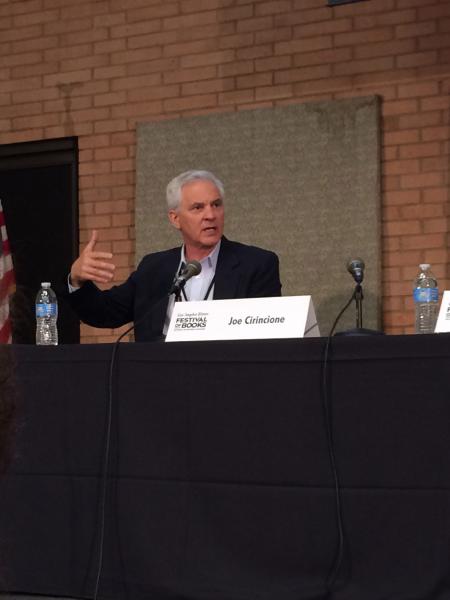L.A. Times Festival Of Books: The World In Crisis

This intertwined global unit works when the countries come together diplomatically and solve their issues democratically. However, when different cultures with varying ideologies come together, their conversations may not be as diplomatic as expected. One increasingly impending global issue and public safety matter is the imminent danger of nuclear warfare.
The Los Angeles Times Festival of Books addressed this issue in the “Current Events: World in Crisis” panel discussion and answer session. Los Angeles Times page one editor, Scott Kraft, moderated the event and interviewed three foreign policy expert panelists.
The Panelists
Dr. Jerrold D. Green is currently a research professor at the University of Southern California’s Annenberg School for Communication and Journalism. He specializes in United States and Middle East policy and the politics of the Arab world and Iran. Dr. Green also directs the Pacific Council on International Policy.
Greg Treverton is the director of the RAND Center for Global Risk and Security. In his research publication, “Making Policy in the Shadow of the Future," he focuses on energy, climate change, defense policy and the reshaping of international law and how they will influence the future of our world.
Joseph Cirincione is president of Ploughshares Fund, a global security foundation. Cirincione is also a member of Secretary of State John Kerry’s International Security Advisory Board and the Council on Foreign Relations. In his book called “Nuclear Nightmares: Securing the World Before it is Too Late," he addresses the threat that nuclear weapons pose on the future of our globe and how various countries are developing or abandoning nuclear weapon programs.
The Discussion
Kraft opened stating that the most popular story on the LA Times, with the most Facebook shares and tweets, is about the nuclear weapon program in Iran. There is a legitimate concern among the global population about their security and the possibility that the future of the world may be attributed to nuclear warfare.
Kraft’s first asked the panelists about what keeps them up at night.
“President Obama answered this question last year, and he said nuclear weapons. I am glad he said that,” said Cirincione. Although nuclear warhead counts globally since the Cold War has dramatically decreased from 70,000 units to 17,000 units, Cirincione believes that the number of nuclear warheads is still a danger to the world.

Dr. Green believes that the homelessness issue in Los Angeles needs to be addressed so people do not have to suffer. He mentions that he sees homeless people outside his office every day and that their condition affects him deeply. Dr. Green also believes that nuclear proliferation is a topic that poses a major threat to the future of humanity.
Kraft shifted the discussion to focus on if diplomatic conversations with Iran are actually working. All the panelists agreed that the recent conversations between President Rouhani of Iran and President Obama have been beneficial. After speaking with President Rouhani, Cirincione truly believes that Iran and the United States want to make amends and create a better, more communicative relationship.
President Rouhani told Cirincione at their meeting that, “The table cannot bear the weight of all these issues,” so it is time to mend these differences so there will be no more trouble. “I see the Iran nuclear issue as a gateway issue. We need to fix this issue before we start fixing others,” said Cirincione.
Dr. Green agreed with Cirincione.
“Iran wants to be part of the global community,” he said, and “a greater threat comes from those who oppose the deal on both sides.” Dr. Green believes that proper communication is the key to mending relations between Iran and the United States. All three panelists noted that the next few months of Iranian/U.S. communication will be crucial because both sides want to make a deal that would reduce and/or remove the nuclear program in Iran and improve relations between the United States and Iran.
Dr. Green also adds that many Iranians blame the United States for their financial struggles because of the sanctions the United States has put on Iran, calling it a big "communication issue." Although the sanctions have contributed to the economic struggles faced in Iran, Dr. Green believes that Iranian citizens do not understand the negative impact of former President Ahmadinejad’s regime had on their economy, without including taking the sanctions into account.

“I give the U.S. a mixed grade in foreign policy,” Treverton said after he explained United States' policy regarding Syria and Egypt. Dr. Green notes that although foreign policy has been on the fence, the administration has been bold with policy in Iran, which has led to more amends in recent years.
Cirincione became very passionate about this question because he works closely with Secretary of State, John Kerry, on these matters. Cirincione mentions that Americans are quick to blame everything on President Obama and blame him for being weak when it comes to foreign policy. However, Cirincione noted that Americans only view the presidency at face value and forget all the previous negotiations that were made with former presidents. Cirincione mentioned that President Obama inherited a damaged economy and a war that the United States should never have been involved with in the first place. During this speech, the crowd began clapping and cheering.
Dr. Green concluded his thoughts about U.S. foreign policy by saying that, “Power doesn’t necessarily corrupt. But, power changes one’s perspective.” All three panelists had a positive outlook for the future if the United States and Iran continue to have positive diplomatic conversations.
Reach Staff Writer Niki Hashemi here and follow her on Twitter.



